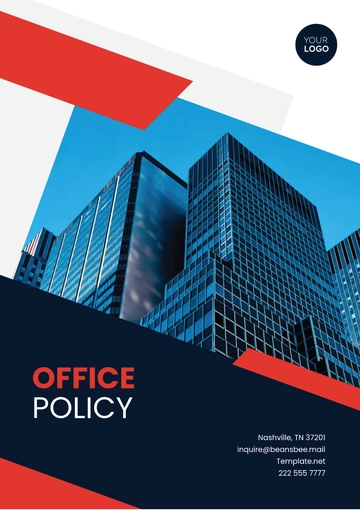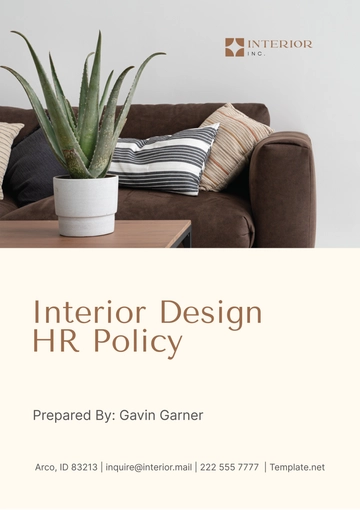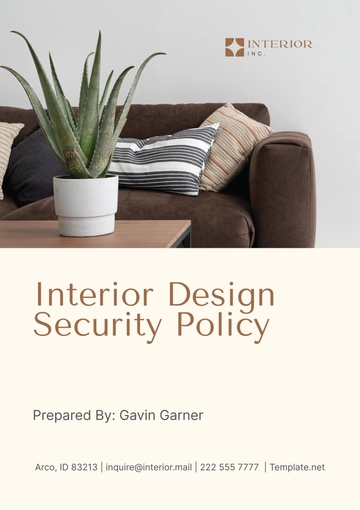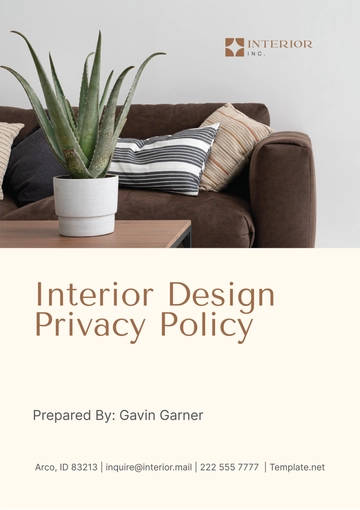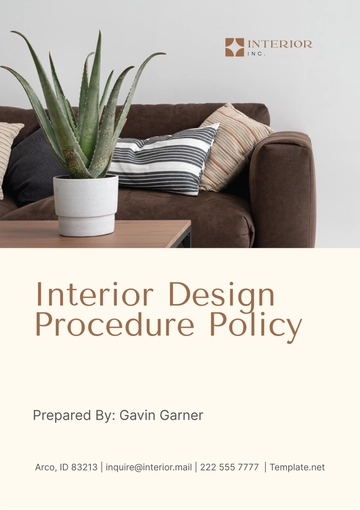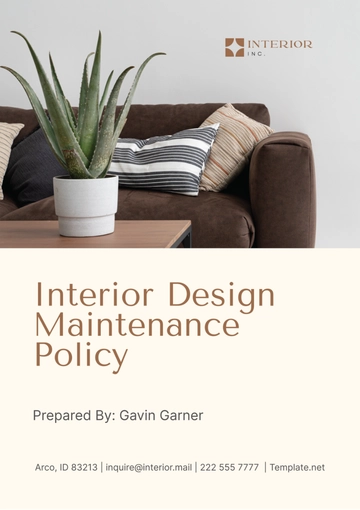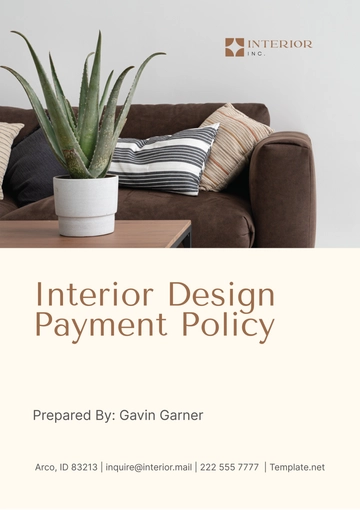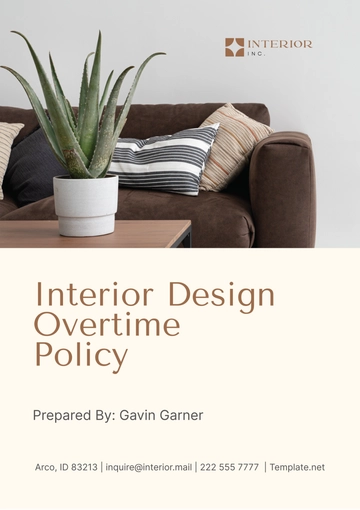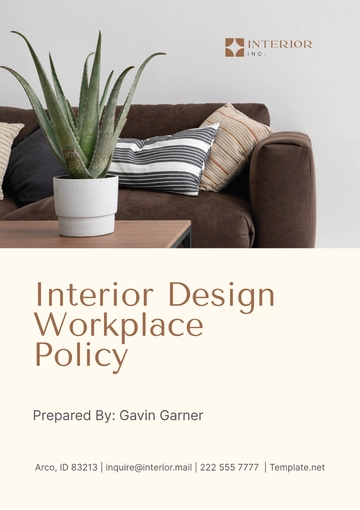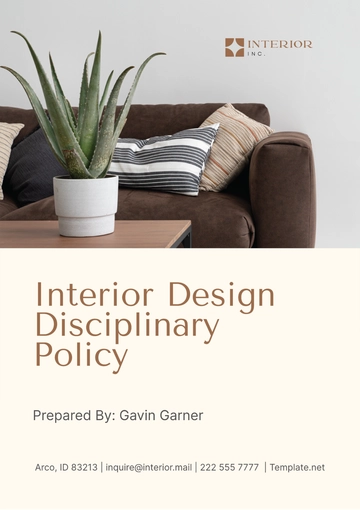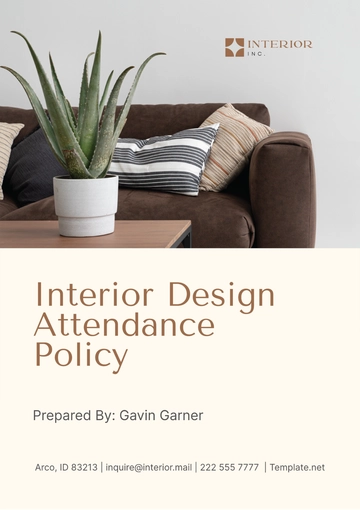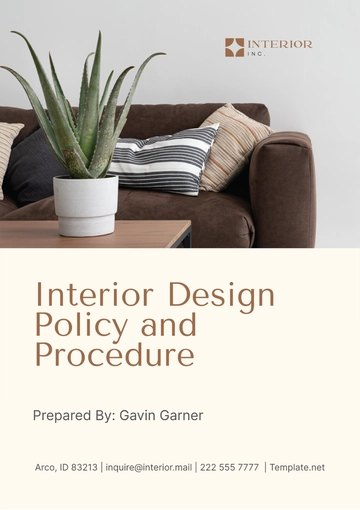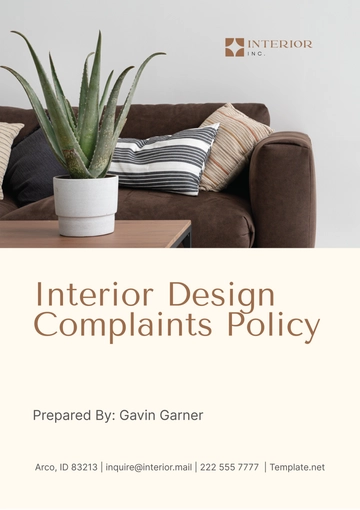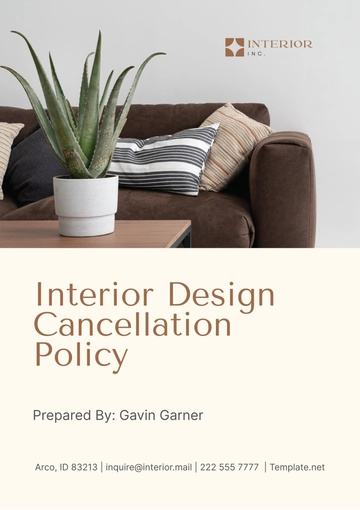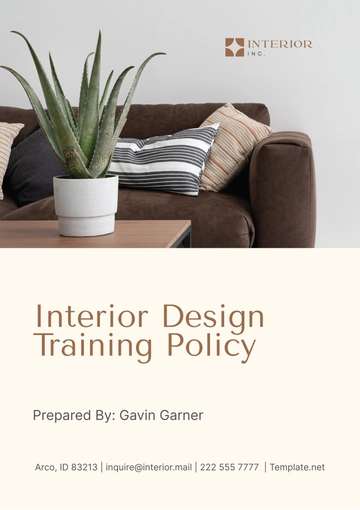Free Interior Design Attendance Policy
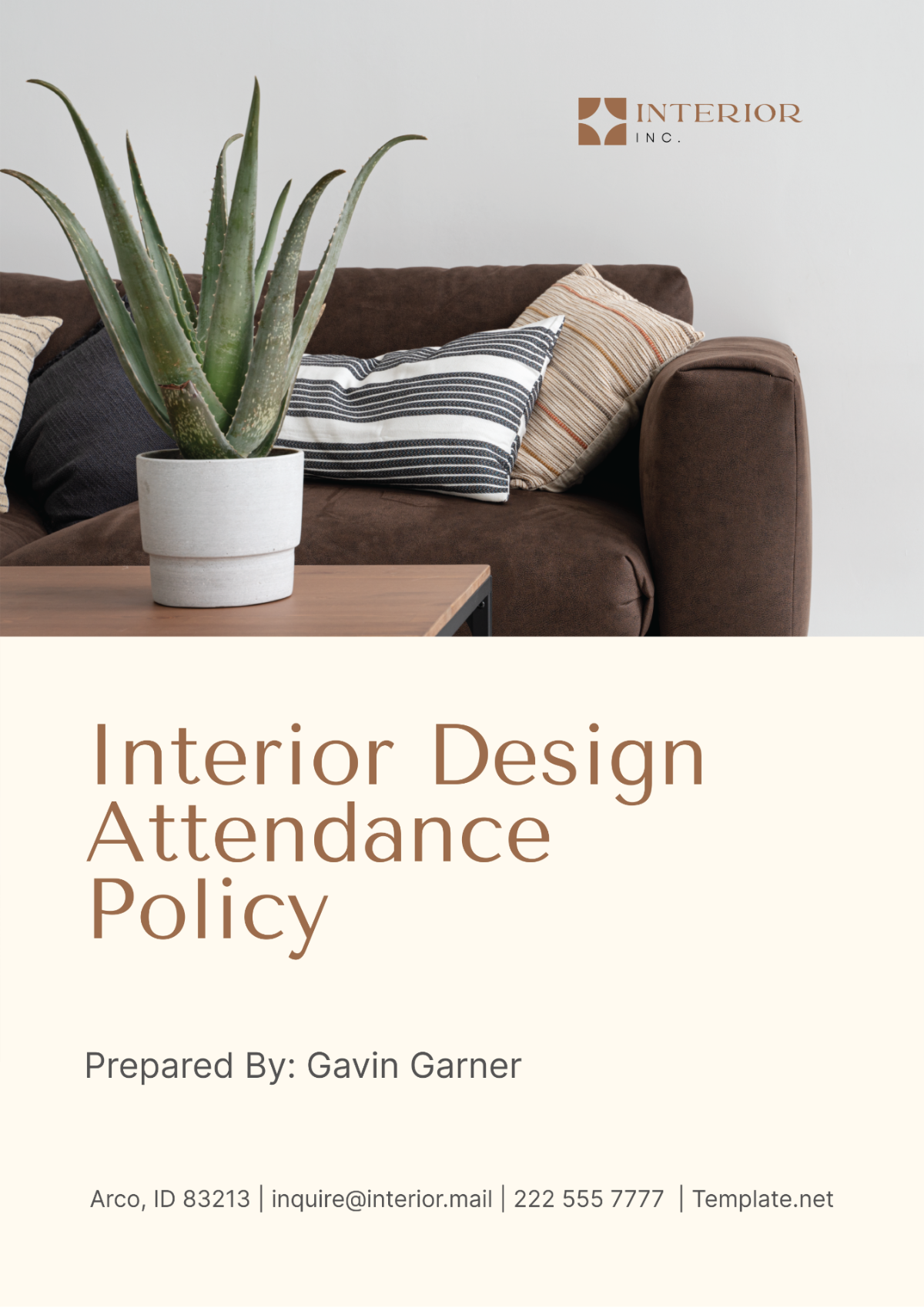
A. Purpose and Scope
The purpose of this Attendance Policy is to establish clear and consistent guidelines for the management of attendance within [Your Company Name]. This policy ensures that all employees understand and meet the expectations regarding their presence at work, which is essential for maintaining operational efficiency and meeting the demands of our clients. Adherence to this policy supports our commitment to fair treatment of all employees and helps foster a productive and collaborative work environment conducive to achieving high-quality interior design outcomes.
This policy applies to all employees of [Your Company Name], including full-time, part-time, contractual, and temporary staff. By setting forth these guidelines, we aim to minimize disruptions caused by unscheduled absences and tardiness, thereby enhancing our capability to deliver exceptional service to our clients and uphold our reputation in the interior design industry.
B. Attendance Requirements
At [Your Company Name], we recognize the importance of a balanced and flexible work environment, especially in the creative field of interior design. Our attendance requirements are designed to accommodate the dynamic nature of our projects while ensuring that team collaboration and client needs are met effectively. Below is a detailed breakdown of our standard work hours, expectations for regular attendance, and options for flexible work arrangements, which include staggered hours and remote work provisions.
Aspect | Details | Notes |
|---|---|---|
Standard Work Hours | Monday to Friday, 9:00 AM to 5:00 PM | Core hours required unless otherwise approved. |
Break Periods | Morning: 10:30 AM to 10:45 AM Lunch: 12:30 PM to 1:30 PM Afternoon: 3:00 PM to 3:15 PM | Breaks are mandatory to ensure compliance with labor laws. |
Remote Work | Available upon approval for specific roles or projects | Must be pre-approved by the supervisor and HR. |
Staggered Hours | Optional, must be coordinated with the direct supervisor | Intended to provide flexibility while ensuring team coverage. |
Reporting Absences | Must be reported to the supervisor by 8:00 AM on the day of absence | Timely reporting is essential for project and team coordination. |
Tardiness | Should be minimized; frequent tardiness to be discussed with HR | Repeated tardiness may result in disciplinary action. |
C. Procedures for Reporting Absence
Effective communication is crucial for managing unexpected absences and maintaining workflow continuity. At [Your Company Name], we have established a straightforward procedure for reporting absences to ensure that projects continue smoothly and team responsibilities are covered. Here are the steps to be followed by employees when reporting absences or lateness:
Notify Supervisor ↓ Use Approved Methods ↓ Report Timely ↓ Provide Details |
|---|
Notify Supervisor: Immediately inform your direct supervisor about your absence. If unavailable, contact the Human Resources (HR) department.
Use Approved Methods: Report your absence via email or phone. Preferably, emails should be sent to your supervisor's official company email, with a phone call for same-day notifications.
Report Timely: Notify your supervisor or HR at least one hour before your scheduled start time. In case of sudden illness or emergency, report as soon as possible.
Provide Details: Include a clear reason for your absence and the expected return date. Suggest possible coverage for your duties if feasible.
D. Tardiness and Early Departures
Punctuality is essential in maintaining the integrity and efficiency of our workplace at [Your Company Name]. This section outlines our policy on tardiness and early departures, which are expected to be exceptions rather than regular occurrences. Our goal is to minimize disruptions and maintain fairness among all team members.
Policy on Tardiness
Recording Tardiness: Tardiness will be recorded by the direct supervisor and noted in the employee’s attendance record.
Acceptable Instances: Employees are allowed up to three instances of tardiness per quarter. Beyond this, tardiness may be subject to disciplinary action.
Consequences: Frequent tardiness will initially result in a verbal warning. Continued issues may lead to written warnings, and persistent non-compliance could result in further disciplinary actions, including termination.
Policy on Early Departures
Recording Early Departures: Similar to tardiness, early departures must be approved by a supervisor and will be recorded in the employee’s attendance record.
Acceptable Instances: Up to three early departures per quarter are generally acceptable, provided they are reported and approved in advance.
Consequences: Unreported or frequent early departures will follow a disciplinary process similar to that for tardiness, starting with verbal warnings and potentially leading to more severe consequences if the behavior continues.
These policies are designed to ensure that all employees contribute equally to the workflow and project demands, thereby supporting the overall productivity and collaborative environment of the firm.
E. Types of Leave
At [Your Company Name], we value the well-being and diverse needs of our employees, recognizing that various types of leave are essential for maintaining personal health, family well-being, and work-life balance. Below is a table outlining the types of leave available, along with their entitlements, request procedures, and approval processes.
Type of Leave | Entitlement | Request Procedure | Approval Criteria |
|---|---|---|---|
Annual Leave | Paid vacation days based on tenure and position | Submit request form to supervisor two weeks in advance | Subject to staffing levels and project timelines |
Sick Leave | Set number of paid sick days annually | Notify supervisor before workday starts | May require a doctor’s note if more than three days |
Personal Leave | For personal matters like jury duty, bereavement | Notify supervisor as soon as possible | Based on reasonability and operational needs |
Maternity/Paternity Leave | According to federal and state laws | Notify HR and supervisor one month in advance | Guaranteed under FMLA and applicable state laws |
F. Disciplinary Actions for Attendance Issues
Maintaining consistent attendance is critical for the smooth operation of [Your Company Name]. To ensure fairness and transparency, our disciplinary process for attendance issues is clearly defined. This process helps manage instances of unapproved absences, tardiness, and early departures, aligning with our commitment to uphold a professional and accountable workplace environment. Below is a detailed table describing the steps in our disciplinary process, which escalates based on the severity and frequency of the attendance issues.
Stage | Condition | Action Taken |
|---|---|---|
First Offense | First instance of unexcused absence or tardiness | Verbal warning and discussion with supervisor |
Second Offense | Second instance within the same quarter | Written warning and review of attendance policy |
Third Offense | Third instance within the same quarter | Final written warning and possible suspension |
Further Offenses | Additional instances after third offense | Termination of employment |
G. Policy Modification and Exceptions
[Your Company Name] reserves the right to modify the Interior Design Attendance Policy at any time to better align with business needs, legal requirements, or employee feedback. Changes to the policy will be communicated through official internal channels such as email or company meetings, ensuring all employees are aware and understand the new guidelines. Employees are encouraged to provide feedback, which will be considered during policy updates.
Exceptions to this policy may be made to accommodate special circumstances such as disabilities or other legally protected reasons. These exceptions are evaluated on a case-by-case basis by the Human Resources department in consultation with legal advisors to ensure compliance with federal and state employment laws.
- 100% Customizable, free editor
- Access 1 Million+ Templates, photo’s & graphics
- Download or share as a template
- Click and replace photos, graphics, text, backgrounds
- Resize, crop, AI write & more
- Access advanced editor
Transform your interior design studio's attendance management with Template.net's Interior Design Attendance Policy Template. This editable and customizable template streamlines your workforce management. Crafted for efficiency, it's editable in our Ai Editor Tool, ensuring seamless customization. Elevate your studio's productivity and professionalism with this essential business document.
You may also like
- HR Policy
- Restaurant Policy
- Company Policy
- Accounting Policies and Procedures
- Website Policy
- Privacy Policy
- Safety Policy
- School Policy
- IT and Software Policy
- Law Firm Policy
- Construction Policy
- Interior Design Policy
- Travel Agency Policy
- Education Academic Policy
- Security Policy
- Real Estate Policy
- Expense Policy
- Software Policy
